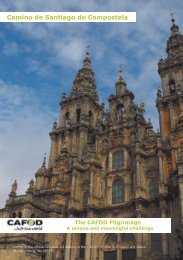Religious Education Curriculum Directory (3-19) - The Catholic ...
Religious Education Curriculum Directory (3-19) - The Catholic ...
Religious Education Curriculum Directory (3-19) - The Catholic ...
- No tags were found...
Create successful ePaper yourself
Turn your PDF publications into a flip-book with our unique Google optimized e-Paper software.
<strong>Catholic</strong> Bishops’ Conference of England and Wales — Department of <strong>Catholic</strong> <strong>Education</strong> and FormationAREA OF STUDY 1: REVELATION: DEI VERBUMWithin this area of study pupils are led into an exploration of the revelation of Jesus Christin Scripture and History. Because revelation of God in Jesus Christ is ‘the foundation offaith’ 25 this first Area of Study may be regarded as underpinning the whole. Key referencepoints in the Catechism are provided (numbers refer to paragraphs).1.1 KNOWING AND LOVING GODPupils’ teaching and learning is focussed on how through God’s Self-Revelation we come to knowthat God’s life is love, both given and received. Though we can know God with certainty by naturalreason, there is another order of knowledge: the order of divine Revelation. Through grace, God hasrevealed himself and given himself to human beings. This he does by revealing the mystery, his planof loving goodness, formed from all eternity in Christ, for the benefit of all people. God has fully revealedthis plan by sending us his beloved Son, our Lord Jesus Christ, and the Holy Spirit.1.1.1. <strong>The</strong> Nature of Revelation: How Do WeKnow About God? (1-3, 27-35)A <strong>The</strong> human appetite for God (1-3, 27-30, 44-45,1718)a Within all people there is a longing for Godb This longing comes from God, who desires andinitiates a relationship with each personc Only in God can lasting joy and peace befound in this life and in the nextB God revealed in different ways (31-35)a Natural Revelation (32-34) mentioned inScripture (32)b Old Testament references: e.g. Genesis andWisdomc Paul’s Letter to the Romans (32)d <strong>The</strong> Fathers of the Church (32)e Arguments for the existence of God fromScholastic theology (31, 34) especially St.Thomas Aquinas and the ‘Five Ways’f Vatican I: we can grasp with certainty the ex-istence of God through human reason (36-38,46-47)g Contemporary arguments based on thehuman person’s openness to truth, beauty,moral goodness, freedom, voice of conscience(33)C Divine Revelation (50-53, 68-69)a Definition (50)b Scripture as the divinely inspired story ofGod’s Revelation in human history (54-64, 70-72)i <strong>The</strong> Patriarchs: Abraham, Isaac, Jacob (59,145, 147)ii Moses (61)Diii Old Testament prophets (61-64, 522)iv John the Baptist (523, 717-720)v Jesus Christ, the definitive Word of Revela-tion, the one to whom all Scripture bears witness,is God’s only begotten Son (65-67, 73,101-104, 134, 423)<strong>The</strong> transmission of Divine Revelation (74-95)a <strong>The</strong> Apostolic Tradition (74-79, 96)b <strong>The</strong> relationship between Tradition and Sa-cred Scripture (80-83, 97)c <strong>The</strong> Deposit of Faith and the rôle of the Church(84-95, 98-100)1.1.2. <strong>The</strong> Nature of Revelation: God’s gift ofhimself (74-100)A Scripture, Tradition, and the depositum fidei(74-100, 103-108, 134-135)a Definitionsb Scripture is the inspired record of God’s Reve-lation in historyc Tradition is the living transmission of themessage of the Gospel in the Church1.1.3. Faith: the response to God’s self-Revelation(144-165)A Faith in general (143-144, 153-165)a Grace that enables an assent of mind, heart,and will (143)b Willingness to believe and trust in what Godhas communicated to usc Relationship with God: Father, Son, and HolySpirit (150-152)B Faith in Jesus Christ leading to discipleship (520,546, 562, 654, 1533)13
















